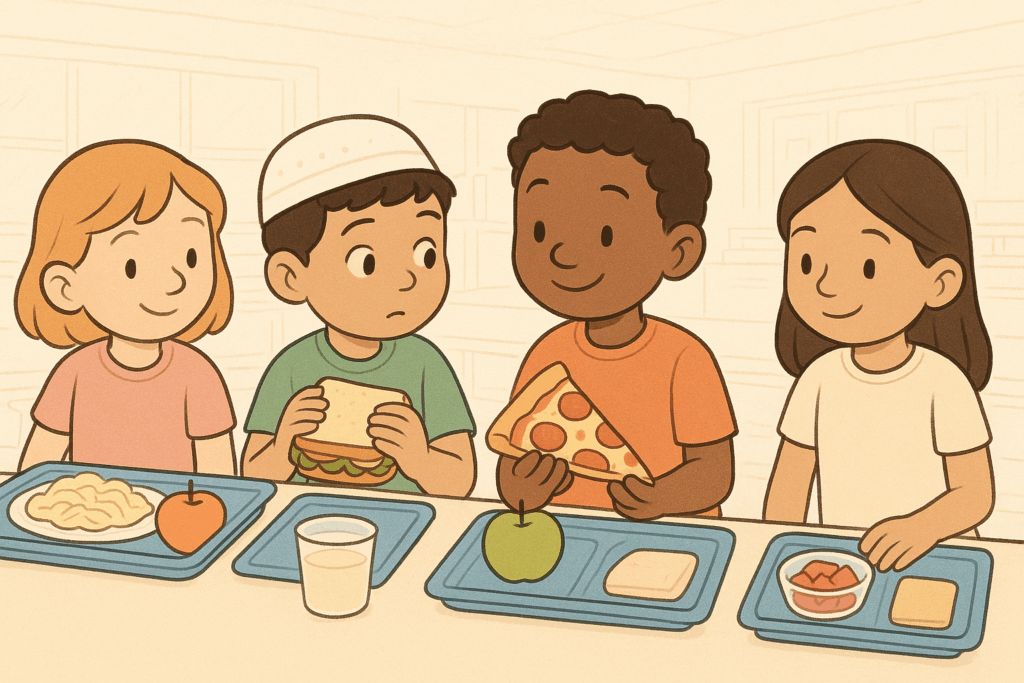
Why Can’t Muslims Eat Pork? | Simple & Powerful Explanation for Kids
Some questions our kids ask can stop us in our tracks.
“Why can my friend eat bacon but I can’t?” isn’t just about food — it’s about belonging, identity, and understanding the why behind our values.
For many of us as Muslim parents, pork isn’t even a temptation. It’s something we’ve instinctively avoided since childhood. But for our kids, especially those growing up surrounded by friends who eat it daily, it’s not so simple.
The answer isn’t just “because it’s haram.” Our goal is to help them feel the wisdom in that rule — to see the animal for what it is, understand its role in the world, and naturally reject what isn’t good for them.
Table of Contents
What to say to kids who ask why they can’t eat pork?
“But mom… all my friends eat pizza with pepperoni, and I’m the weirdo who can’t!”
In order to answer that, we need to take a step back. Why are we, as adults, disgusted by pork and know we’d never eat it — short of literally dying of hunger?
Following rules works best when it comes from a deep understanding of what things truly are.
Remember those times we sat down to watch those horrendous documentaries about McDonald’s, fast food, and how unhealthy the American population had become? Fast forward a few decades: barely anyone gives their kids McDonald’s now — unless it’s an occasional treat. That rejection, that disgust, that discipline comes from understanding.
So the real question becomes: how do we build that understanding with our kids?
Let’s reverse-engineer ourselves as parents.
Why pork is haram
Allah tells us clearly in the Qur’an:
إِنَّمَا حَرَّمَ عَلَيْكُمُ ٱلْمَيْتَةَ وَٱلدَّمَ وَلَحْمَ ٱلْخِنزِيرِ وَمَآ أُهِلَّ بِهِۦ لِغَيْرِ ٱللَّهِ ۖ فَمَنِ ٱضْطُرَّ غَيْرَ بَاغٍۢ وَلَا عَادٍۢ فَلَآ إِثْمَ عَلَيْهِ ۚ إِنَّ ٱللَّهَ غَفُورٌۭ رَّحِيمٌ
“He has only forbidden to you dead animals, blood, the flesh of swine, and that which has been dedicated to other than Allah.”
(Surah Al-Baqarah, 2:173)
God didn’t tell us exactly why — only that it is forbidden.
But if we take a step back to a time when humans mainly lived on farms, it was quite obvious what pigs are. People could see firsthand the animal’s habits, its diet, and its role on the farm.
So let’s go deeper down the rabbit hole, and look at pigs not just as animals, but as part of an ecosystem.
Why pigs are dirty animals
Pigs are nature’s decomposers — the vultures of the ground. They’ll eat anything in front of them: garbage, rotting food, even dead animals.
Cows, sheep, and other grazing animals? They eat grass, grains, and plants — “pure” food sources.
And here’s something important: you are what you eat. An animal that lives off garbage becomes, quite literally, garbage in meat form.
Our ancestors didn’t have to be told the nutritional science behind this — they could see it every day.
The Western illusion that bacon is tasty
The Western world was built on the idea that “meat is meat” — that all that matters is what you see on the plate.
Wrap pork in fancy packaging, slice it thin, smoke it, and give it a nice name like “bacon,” and you could almost believe it’s a premium meat.
But if you asked the same people whether they’d eat vulture or hyena meat, they’d recoil. The only reason pork is perceived differently is marketing.
And that illusion starts to break when you notice how pork is sometimes cheaper than certain vegetables or fruits. Cheap doesn’t always mean good.
So… Why can my friend eat bacon but I can’t?
Because it’s not just about taste — it’s about what the animal is, what it does, and the wisdom God has given us in what we’re allowed to eat.
And Muslims aren’t the only ones. Many cultures with long histories and refined civilizations avoided pork entirely.
But here’s the tricky part: this is hard to explain to a kindergartner.
That’s why we made it simple for you — with a story that takes kids on a mountain hike, where they discover for themselves what pigs eat, and why that matters.
Q: Why can’t we eat everything?
A: Surat Al Maidah 5:5 ‘All good, pure foods have been made lawful for you’ "الْيَوْمَ أُحِلَّ لَكُمُ الطَّيِّبَاتُ"
Q: Why do we say 'Bismillah' before eating?
A: Saying 'Bismillah' reminds us to thank Allah for the food we have and to eat in a way that’s mindful and blessed.
Q: Why are pigs considered dirty animals?
A: Because they eat decaying matter, garbage, and dead animals, which helps clean the environment (decomposer)—but makes them unsafe to eat.
A gentle, engaging way to help kids understand halal and haram foods — without lectures or long explanations.
📖 Want to preview this story?
Explore A Taste of Mayous — our free collection of Muslim storybook previews. See how we blend Islamic values, science, and heartwarming lessons kids love.
